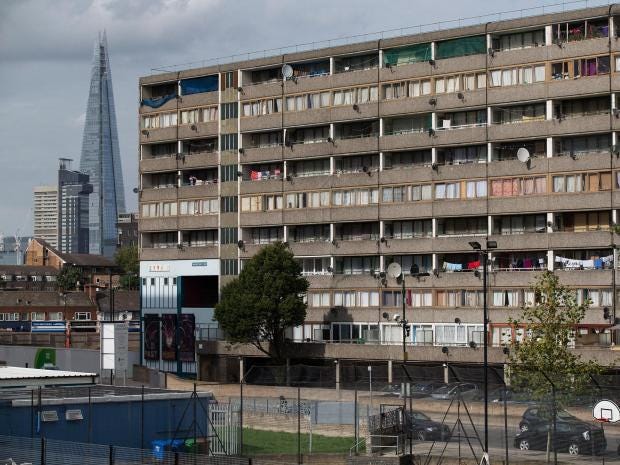Ian Shires
Liberal DEMOCRAT Activist Learn more
If you thought the housing crisis was bad enough, the UK just lost its biggest funder of social housing
by Ian Shires on 25 August, 2017
Published in the Independent by Neena Gill 24 August 2017 Voices
The £1bn given by European Investment Bank to UK social housing projects last year makes it the sector’s biggest investor. This week it was confirmed that this investment would stop
Independent Voices

Social housing in Southwark, London Getty Images
I worked for housing associations throughout the 80s and 90s and one memory remains more vivid than any other. I was called out to visit a new client who told us he had been trying to relocate for the past three years.
After climbing a steep set of stairs, I reached his second floor apartment. The man welcomed me in and explained that he was severely disabled from the waist down. He was wheelchair bound, so he was forced to remain indoors for all but essential trips. There was no lift.
On the rare occasions that he left the apartment, he had to scramble downstairs, using only his arms for balance. As you can imagine, wrenching himself upstairs again on the way back up was almost impossible.
Due to a lack of suitable housing it was difficult, but we were finally able to relocate him to a ground floor apartment. When I delivered the good news, he broke down, flooding the room with tears of appreciation.
I have never seen anyone so grateful to be given something which should always have been their right. No one living in the UK – the world’s 5th largest economy – should have their dignity stripped from them like this.
Sadly these stories have become more common over the past 20 years. Much has been written about the housing crisis, but there has been little action. In Birmingham only 780 homes were built in 2016. This means that the city’s population is growing five times faster than homes are being built, pushing house prices up across the West Midlands.
A general housing crisis puts enormous pressure on social housing. The most vulnerable are the first to be neglected and their human rights to adequate shelter are too often forgotten.
The looming spectre of Brexit looks set to make the problem even worse. The £1bn given by European Investment Bank (EIB) to UK social housing projects last year makes it the sector’s biggest investor.
This week – as a direct result of the triggering of Article 50 – it was confirmed that this investment would stop. With the social housing sector already strained, we cannot afford to lose £1 of funding, let alone £1bn.
We need to find substitute funds to help stem the deepening of the social housing crisis, but this will not cure the problem. The solution requires more than just funding: we need legislative changes that encourage the development of at least 300,000 houses per year. I suggest two.
The first, explained convincingly in yesterday’s Financial Times, is to change the 1961 Land Compensation Act to let local authorities buy land at the current use value. Currently when councils buy land to build more housing, they are obliged to pay a price which includes potential planning permissions. This inflates pricing, discouraging the building of homes and inflating the costs of those that do exist.
Secondly, we need to agree to reformulate outdated regulations on green-belt land. Much of the so-called ‘greenbelt’ land is hardly green at all. The phrase may conjure up images of idyllic parkland home to beautiful wildlife, but the reality is that much of it is low-grade scrubland, inaccessible to the public.
Within the M25 which circles greater London there are 110,000 hectares of green belt land. If we built on just one quarter of this land, we could provide more than one million new homes.
It is easy to get lost in statistics when talking about our housing crisis, but the reality is that this is a human problem. For every home under the required 300,000 not built, a family, a couple, or a single person is left without a suitable place to live.
The housing crisis is one of the biggest causes of inequality in this country, but it is also one of the simplest to solve. We just need to build more houses.
Leave a comment
Leave a Reply